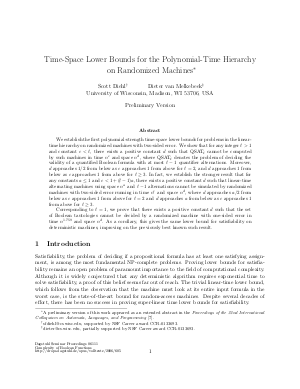Time-Space Lower Bounds for the Polynomial-Time Hierarchy on Randomized Machines
Authors Scott Diehl, Dieter van Melkebeek
-
Part of:
Volume:
Dagstuhl Seminar Proceedings, Volume 6111
Part of: Series: Dagstuhl Seminar Proceedings (DagSemProc) - License:
 Creative Commons Attribution 4.0 International license
Creative Commons Attribution 4.0 International license
- Publication Date: 2006-10-09
File

PDF
DagSemProc.06111.20.pdf
- Filesize: 351 kB
- 33 pages
Document Identifiers
Subject Classification
Keywords
- Time-space lower bounds
- lower bounds
- randomness
- polynomial-time hierarchy
Metrics
- Access Statistics
-
Total Accesses (updated on a weekly basis)
0Document
0Metadata
Abstract
In this talk, we establish lower bounds for the running time of randomized
machines with two-sided error which use a small amount of workspace to
solve complete problems in the polynomial-time hierarchy. In particular,
we show that for integers $l > 1$, a randomized machine with two-sided error
using subpolynomial space requires time $n^{l - o(1)}$ to solve QSATl, where
QSATl denotes the problem of deciding the validity of a Boolean first-order
formula with at most $l-1$ quantifier alternations. This represents the first
time-space lower bounds for complete problems in the polynomial-time
hierarchy on randomized machines with two-sided error.
Corresponding to $l = 1$, we show that a randomized machine with one-sided
error using subpolynomial space requires time $n^{1.759}$ to decide the set
of Boolean tautologies. As a corollary, this gives the same lower bound for
satisfiability on deterministic machines, improving on the previously best
known such result.
Cite As Get BibTex
Scott Diehl and Dieter van Melkebeek. Time-Space Lower Bounds for the Polynomial-Time Hierarchy on Randomized Machines. In Complexity of Boolean Functions. Dagstuhl Seminar Proceedings, Volume 6111, pp. 1-33, Schloss Dagstuhl – Leibniz-Zentrum für Informatik (2006)
https://doi.org/10.4230/DagSemProc.06111.20
BibTex
@InProceedings{diehl_et_al:DagSemProc.06111.20,
author = {Diehl, Scott and van Melkebeek, Dieter},
title = {{Time-Space Lower Bounds for the Polynomial-Time Hierarchy on Randomized Machines}},
booktitle = {Complexity of Boolean Functions},
pages = {1--33},
series = {Dagstuhl Seminar Proceedings (DagSemProc)},
ISSN = {1862-4405},
year = {2006},
volume = {6111},
editor = {Matthias Krause and Pavel Pudl\'{a}k and R\"{u}diger Reischuk and Dieter van Melkebeek},
publisher = {Schloss Dagstuhl -- Leibniz-Zentrum f{\"u}r Informatik},
address = {Dagstuhl, Germany},
URL = {https://drops.dagstuhl.de/entities/document/10.4230/DagSemProc.06111.20},
URN = {urn:nbn:de:0030-drops-6054},
doi = {10.4230/DagSemProc.06111.20},
annote = {Keywords: Time-space lower bounds, lower bounds, randomness, polynomial-time hierarchy}
}
